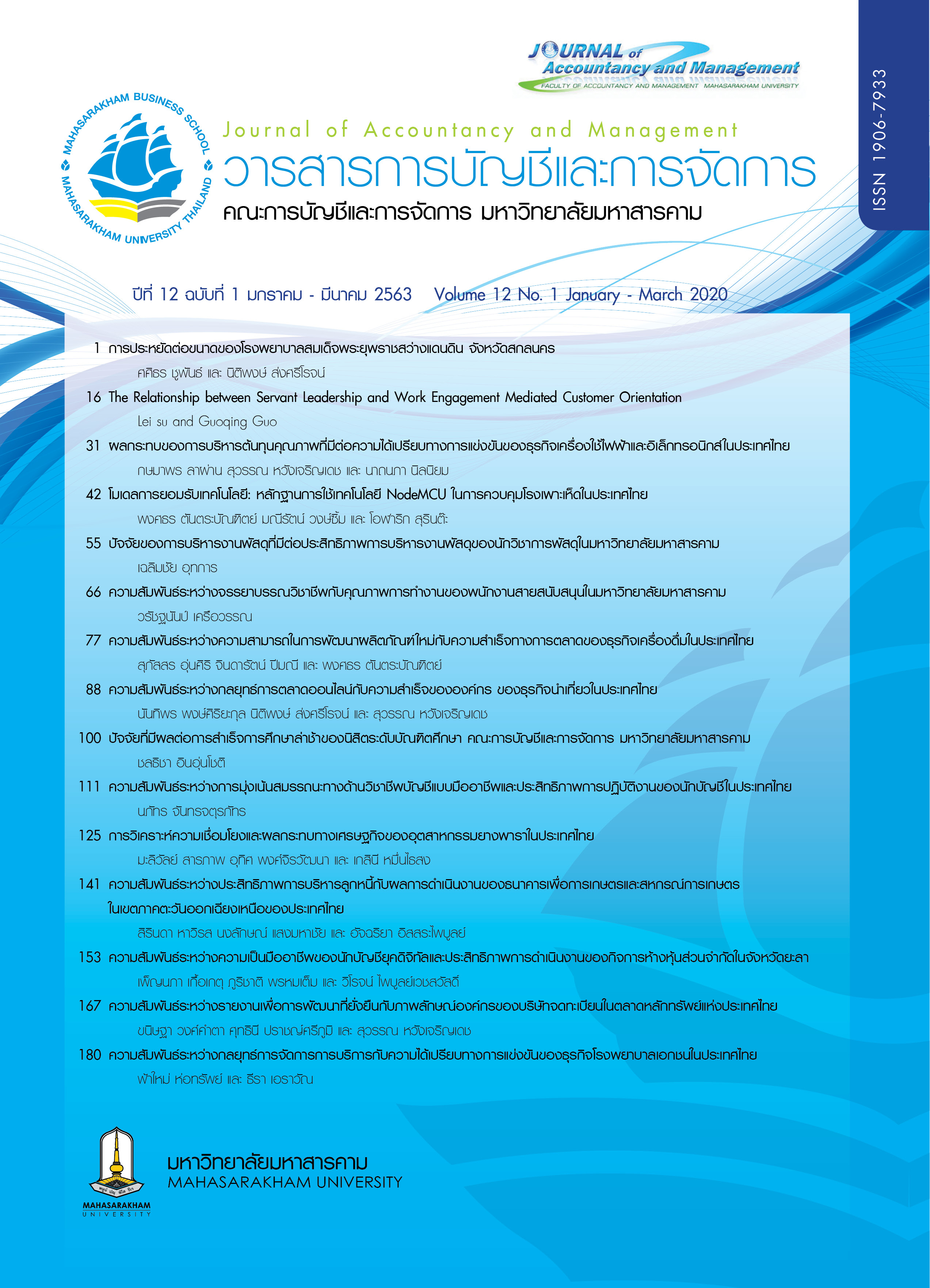ปัจจัยที่มีผลต่อการสำเร็จการศึกษาล่าช้าของนิสิตระดับบัณฑิตศึกษาคณะการบัญชีและการจัดการ มหาวิทยาลัยมหาสารคาม
Main Article Content
บทคัดย่อ
การวิจัยครั้งนี้มีวัตถุประสงค์เพื่อศึกษาปัจจัยที่มีผลต่อการสำเร็จการศึกษาล่าช้าของนิสิตระดับบัณฑิตศึกษา คณะการบัญชีและการจัดการ มหาวิทยาลัยมหาสารคาม โดยใช้แบบสอบถามเป็นเครื่องมือในการเก็บรวบรวมข้อมูลจากนิสิตระดับบัณฑิตศึกษา คณะการบัญชีและการจัดการ มหาวิทยาลัยมหาสารคาม จำนวน 284 คน สถิติที่ใช้ในการวิเคราะห์ข้อมูล ได้แก่ สถิติที่ใช้ในการวิเคราะห์ข้อมูล ได้แก่ ค่าเฉลี่ย ส่วนเบี่ยงเบนมาตรฐาน F-test (ANOVA) ผลการวิจัย พบว่า นิสิตระดับบัณฑิตศึกษา คณะการบัญชีและการจัดการ มหาวิทยาลัยมหาสารคาม มีความคิดเห็นด้วยเกี่ยวกับปัจจัยที่ส่งผลต่อการสำเร็จการศึกษาล่าช้า โดยรวมอยู่ในระดับมาก ได้แก่ ด้านการจัดทำวิทยานิพนธ์ ด้านอาจารย์ที่ปรึกษาวิทยานิพนธ์ ด้านปัจจัยที่เกี่ยวข้องกับผู้เรียน ด้านการจัดการเรียนการสอน และด้านระเบียบ/ข้อบังคับ/แนวปฏิบัติ ซึ่งเกิดจากกระบวนการในการทำวิทยานิพนธ์แต่ละขั้นตอนใช้ระยะเวลานาน กระบวนการในการจัดทำวิทยานิพนธ์มีขั้นตอนที่หลากหลาย ซับซ้อน ทำให้คณะต้องมีการบริหารการจัดการและวางแผนในเรื่องของกระบวนการ อาจารย์ที่ปรึกษาในการให้คำปรึกษาและต้องมีเวลาในการดูงานและอ่านงานให้นิสิต ซึ่งจะส่งผลต่อระยะเวลาในการสำเร็จการศึกษาได้อย่างมีประสิทธิภาพ
Downloads
Article Details
บทความที่ได้รับการตีพิมพ์เป็นลิขสิทธิ์ของวารสารการบัญชีและการจัดการ
ข้อความที่ปรากฏในบทความแต่ละเรื่องในวารสารวิชาการเล่มนี้เป็นความคิดเห็นส่วนตัวของผู้เขียนแต่ละท่านไม่เกี่ยวข้องกับมหาวิทยาลัยมหาสารคาม และคณาจารย์ท่านอื่นๆในมหาวิทยาลัยฯ แต่อย่างใด ความรับผิดชอบองค์ประกอบทั้งหมดของบทความแต่ละเรื่องเป็นของผู้เขียนแต่ละท่าน หากมีความผิดพลาดใดๆ ผู้เขียนแต่ละท่านจะรับผิดชอบบทความของตนเองแต่ผู้เดียว
เอกสารอ้างอิง
กองทะเบียนและประมวลผล มหาวิทยาลัยมหาสารคาม. (2560). จำนวนผู้สำเร็จการศึกษาระดับบัณฑิตศึกษา. สืบค้นเมื่อ 20 สิงหาคม 2561. <https://regpr.msu.ac.th/th>
คณะการบัญชีและการจัดการ . (2561). ประวัติความเป็นมาคณะการบัญชีและการจัดการ. สืบค้นเมื่อ 20 สิงหาคม 2561. <https://www.mbs.msu.ac.th/th/index.php?sc=About/Academic>
จิระศักดิ์ บุษราภรณ์. (2546). การศึกษาปัญหาการทำวิทยานิพนธ์ของนักศึกษาหลักสูตรครุศาสตร์อุตสาหกรรมมหาบัณฑิต สาขาวิชาเทคโนโลยีเทคนิคศึกษา สถาบันเทคโนโลยีพระจอมเกล้าพระนครเหนือ. วิทยานิพนธ์ การศึกษามหาบัณฑิต. กรุงเทพฯ : สถาบันเทคโนโลยีพระจอมเกล้าพระนครเหนือ.
ชัยนาถ นาคบุปฝา. (2549). จิตลักษณะกับแรงจูงใจใฝ่สัมฤทธิ์ของนักศึกษาคณะศึกษาศาสตร์. เชียงใหม่ : ศึกษาศาสตร์มหาวิทยาลัยเชียงใหม่.
ณรงค์ ทีประชัย. (2557). การศึกษาความสัมพันธ์ระหว่างปัจจัยบางประการกับความท้อแท้ในการศึกษาของนักศึกษาระดับปริญญาตรีในระบบการศึกษาทางไกล มหาวิทยาลัยเปิดของรัฐ. วิทยานิพนธ์ การศึกษามหาบัณฑิต สาขาการวัดผลการศึกษา มหาวิทยาลัยศรีนครินทรวิโรฒ.
เดชา ลุนาวงค์. (2546). ปัจจัยเชิงสาเหตุที่มีอิทธิพลต่อแรงจูงใจใฝ่สัมฤทธิ์ของนิสิตปริญญาโทมหาวิทยาลัยมหาสารคาม. วิทยานิพนธ์ การศึกษามหาบัณฑิต มหาวิทยาลัยมหาสารคาม.
ทวีพร บุญวานิช. (2551). การประยุกต์โมเดลล็อกลิเนียร์ในการวิเคราะห์สาเหตุเพื่อศึกษาปัจจัยที่ส่งผลต่อระยะเวลาที่ใช้ในการศึกษาของมหาบัณฑิตทางสังคมศาสตร์จุฬาลงกรณ์มหาวิทยาลัย. วิทยานิพนธ์ ครุศาสตรมหาบัณฑิต: จุฬาลงกรณ์มหาวิทยาลัย. บัณฑิตวิทยาลัย.
เทอดศักดิ์ ไชยสมปาน. (2559). ปัญหาการศึกษาไทยและแนวทางการแก้ไข. สืบค้นเมื่อ 20 สิงหาคม 2561. <https://www.gotoknow.org/posts/409185>
ปรียาพร วงศ์อนุตรโรจน์. (2539). จิตวิทยาการศึกษา. กรุงเทพฯ : สุวีริยาสาสน์.
มหาวิทยาลัยมหาสารคาม. (2560). คู่มือการศึกษาระดับบัณฑิตศึกษา มหาวิทยาลัยมหาสารคาม. บัณฑิตวิทยาลัย มหาวิทยาลัยมหาสารคาม.
สถาบันบัณฑิตพัฒนบริหารศาสตร์. (2560). การศึกษาระดับบัณฑิตศึกษา. สืบค้นเมื่อ 20 สิงหาคม 2561. <https://www.nida.ac.th/th/ 2560>
สุธาทิพย์ จรรยาอารีกุล. (2549). ปัญหาการเรียน ส่วนตัว สังคม ของนักศึกษาวิทยาลัยเทคนิค สังกัดกรมอาชีวศึกษา ในกรุงเทพมหานคร . บัณฑิตวิทยาลัย มหาวิทยาลัยเกษตรศาสตร์.
Aaker, D.A., V. Kumar and G. S. Day. (2001). Marketing Research. New York : John Wiley & Sons.
Carroll, J. B. (2003). A Model of School Learning. New York : Teachers College Record, 74, 185-189.
Nunnally, J. C. and I. H. Bernstein. (1978). Psychometric Theory. New York : McGraw – Hill.


